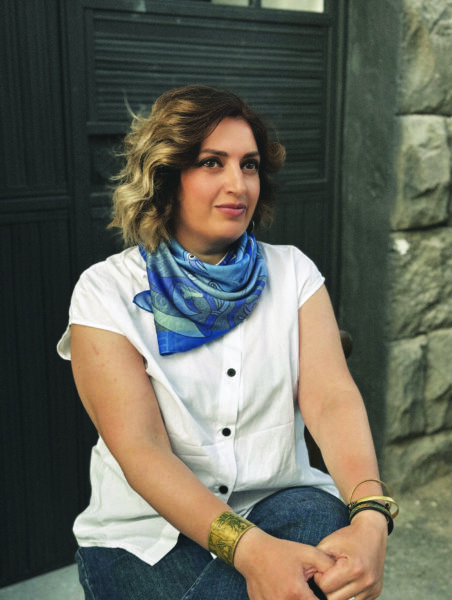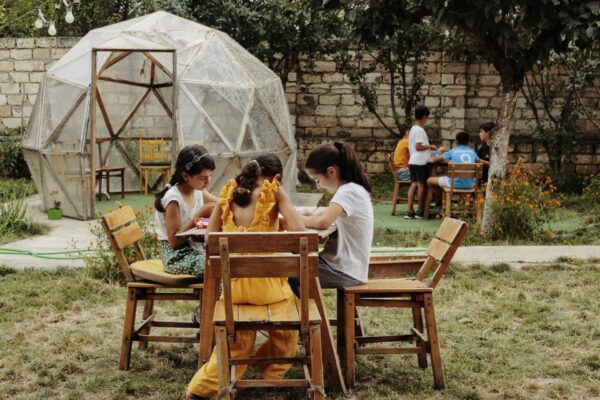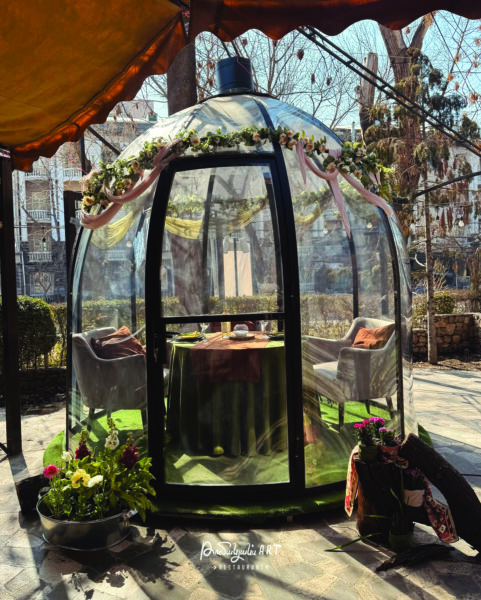By Shushanik Hayriyan
WATERTOWN — On Moskovyan 6/7 in Yerevan, Armenia, Tumanyan’s ART looks like just another restaurant with a cozy space and the smell of good food drifting into the street. Passersby stop for coffee or a bite of zhengyalov hats, never guessing the layers of loss and resilience behind the doors. Few would know this place was born in a war zone, rebuilt in exile, and stands today not only as a restaurant, but a lifeline for the displaced Artsakh community.
Kristina Balayan is the woman at the heart of it all. For Kristina, Tumanyan’s is more than a restaurant: “It’s a space for the displaced Artsakh community to meet, help each other, and stand together,” she says — a way to preserve food and traditions and, soon, she hopes, to launch a new project: a kindergarten for Artsakh children.
Holding steady to the Artsakh identity while adapting to the new reality is the idea behind the kindergarten, where children will preserve their dialect, celebrate holidays as they were back home, and hear Artsakh fairy tales while also receiving early education. This would help the parents struggling to find a job in Yerevan and, while they are settling, the kindergarten would be free. “We move forward with time, but we keep our roots,” repeats Kristina, referring to the motto she has chosen.
Before the restaurant opened its doors in Yerevan, it stood in Stepanakert with a simple and unusual concept: merging an inclusive education center with the concept of a restaurant. Kristina has a background in teaching and worked for decades in education, eventually specializing in working with children with developmental challenges.
Tumanyan’s, named after its location on Tumanyan Street in Stepanakert, kept running during the nine-month-long blockade of Artsakh. Kristina mentions how she had to improvise daily. “First, I’d look up what to cook without eggs,” she remembers. “Then without sugar. Then what to replace it with. One day, I thought, soon I will be asking what I could make with nothing at all.”
When war broke out in 2023, Tumanyan’s served as a place for the internally displaced to get food and shelter while waiting for answers. Days later, once in Armenia, Kristina joined World Central Kitchen in Yerevan to prepare thousands of hot meals each day for the displaced.
On December 2, 2023, Tumanyan’s ART reopened in Yerevan as a platform for Artsakh’s displaced artisans to sell their crafts in the daytime and as a restaurant at night. The menu features an “Artsakh set,” with traditional dishes like lubu shorva (red bean soup traditional to Artsakh) and khashil (roasted and crushed wheat porridge), alongside international and Armenian dishes. Fifteen of its staff members are from Artsakh. “Everything we do is to make sure our people know they are not alone and that our roots will stay alive no matter where we are,” says Kristina.
Artsakh
Balayan’s journey began decades earlier, when her family fled to Artsakh from Baku. Balayan’s parents are originally from Artsakh. Her father was a native of Mehtishen, and his family had previously moved there from Khoy, Iran. After graduating eighth grade in Artsakh, he moved to Baku — like thousands of other Armenians of Artsakh — to continue his education and later secured a job.
Ten years later, when Kristina was 10 years old, the family moved to Artsakh. Shortly after, Kristina lost her father in the First Artsakh War, and her mother raised her and her brother alone, ensuring they received an education despite all the hardships. Balayan earned degrees in law and accounting.
In 2016, Kristina co-founded the first Vernissage in Stepanakert, operating at The Roots, a cafe in Stepanakert founded by French-Armenian Guerard Guergerian. She launched a foundation offering workshops to both special-needs and typically developing children, called the MilaGri Charitable Foundation. Balayan recalls that the idea behind the foundation came to life after the April War of 2016. Back then, following the ‘Four-Day War’ in Artsakh, she was visiting villages in different regions and discovered the impact of various state programs that encouraged larger families while neglecting maternal health. This ultimately resulted in many children being born with various illnesses and disabilities.
It was then that Balayan, combining her experience in education and love for working with children, came up with classes for those with disabilities.
Balayan mentions that cooking is an essential skill for any Armenian woman, as they are traditionally the ones doing it in the family. She recalls learning most of her skills from her mother, who was an excellent cook and baker, preparing many traditional dishes. Initially, when Tumanyan’s couldn’t find a cook, Kristina stepped up to do it herself. Because everyone liked her cooking, she continued.
Reopening Tumanyan’s in Yerevan was a major challenge, especially because they didn’t have the funds to do so. She participated in many masterclasses and workshops, which helped her acquire different equipment for the restaurant through grants, as well as with the help of friends who either regularly visited the restaurant or sent financial support. While she received a lot of help from friends, the government has done nothing to support the process.
If you wish to support the Artsakh kindergarten initiative and contribute to creating a nurturing and inclusive environment for children affected by war and displacement, please reach out to Kristina Balayan directly at [email protected]. Support — whether through donations, resources, or collaboration — can make a meaningful difference in the lives of children and families striving to rebuild their future in Artsakh.
























































